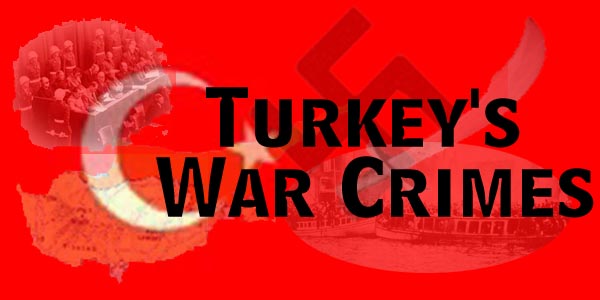Turkey committed war crimes by its illegal invasion of Cyprus on July 20, 1974 when it occupied 4 percent of Cyprus’ territory with the illegal use of American-supplied arms and equipment; and again in the second wave of its invasion on August 14-16, 1974, when it breached a UN cease fire and UN sponsored negotiations, three weeks after the legitimate government of Cyprus had been restored, with a massive attack on the Greek Cypriots and grabbed another 33 percent of Cyprus’ territory.
The European Commission on Human Rights issued a devastating report on July 10, 1976 on two applications by the government of Cyprus regarding Turkey’s invasion of Cyprus.
On January 23, 1977, the London Sunday Times published excerpts from the report and stated: "It amounts to a massive indictment of the Ankara government for the murder, rape and looting by its army in Cyprus during and after the Turkish invasion of summer 1974."
The European Convention on Human Rights is, by the terms of its preamble, an extension of the United Nations Universal Declaration of Human Rights of 1948. The Commission’s report of July 10, 1976 found Turkey guilty of violating the following articles of the European Convention on Human Rights:
Article 2—by the killing of innocent civilians committed on a substantial scale;
Article 3—by the rape of women of all ages from 12-71;
Article 3—by inhuman treatment of prisoners and persons detained;
Article 5—by deprivation of liberty with regard to detainees and missing persons—a continuing violation;
Article 8—by displacement of persons creating more than 170,000 Greek Cypriot refugees, and by refusing to allow the refugees to return to their homes—a continuing violation;
Article 1 of the First Protocol to the Convention—by deprivation of possessions, looting and robbery on an extensive scale.
Who in the Turkish government are responsible for these war crimes? The Prime Minister of Turkey at that time was Bulent Ecevit. He gave the order of the invasion on the recommendation of the Turkish National Security Council which made the decisions on national security, defense and foreign affairs at that time. General Kenan Evren and a majority of its members were military officers.
Then Prime Minister Ecevit, General Evren, the other members of Turkey’s National Security Council and the Turkish army commander in Cyprus all bear responsibility for these war crimes.
What has the United States, Britain, the UN and the international community done about these war crimes? Nothing!
Why was no action taken? The answer involves a combination of points. Turkey was a NATO ally; the U.S. was an accomplice to the invasion through the actions of then Secretary of State Henry Kissinger; and Britain, a guarantor power, had economic interests in Turkey and still harbored resentment against the Greek Cypriots, the 80 percent majority of Cypriots, for seeking self-determination and freedom from Britain in the 1950’s. Further, the U.S. and Britain, permanent members of the UN Security Council, had veto powers.
The UN Security Council and General Assembly passed a number of resolutions following Turkey’s invasion of Cyprus. In summation, the resolutions called upon all states to respect the sovereignty, independence and territorial integrity of Cyprus, demanded the immediate end to foreign occupation and urged "the speedy withdrawal of all foreign armed forces and foreign military presence and personnel from Cyprus and the cessation of all foreign interference in its affairs."
The UN however did not call for military action or economic sanctions against Turkey if Turkey did not comply with the UN resolutions, as the UN did regarding Iraq’s invasion of Kuwait in 1990.
It is worth recalling that President Dwight D. Eisenhower condemned and reversed the invasion of Egypt by Britain, France and Israel in October of 1956. In his October 31, 1956 television and radio report to the nation on the Middle East crisis, Eisenhower said:
The International Criminal Tribunal for the former Yugoslavia (ICTY) was created to punish those who committed war crimes. In July 2005 many thousands of persons attended ceremonies marking the 10th anniversary of the massacre of Bosnian Muslims in Srebrenica. Close to 8,000 men and boys were killed by Bosnian Serb forces in 1995.
Britain’s Foreign Secretary Jack Straw apologized on behalf of the international community for failing to stop the atrocity. He stated, "For it is to the shame of the international community that this evil took place under our noses and we did nothing like enough. I bitterly regret this and I am deeply sorry for it."
To date, the ICTY has convicted three Bosnian Serbs, including Serb army chief-of-staff Gen. Rodosiav Krstic. Former Yugoslav President Slobodan Milosevic is presently on trial and there are nine cases at the pre-trial stage. Still at large are Radovan Karadzic and Gen. Ratko Miadic.
In addition to the more than one thousand innocent Greek Cypriots killed by Turkey’s armed forces, the Turkish Cypriot militia killed five Americans of Greek Cypriot descent. The Turkish armed forces took them into captivity despite their American passports. They turned them over to the Turkish Cypriot militia, which was under the command of the Turkish Cypriot leader Rauf Denktash. Denktash has stated that the five Americans were killed by his Turkish Cypriot militia forces.
What has the U.S. done regarding Turkey’s war crimes and the killing of five Americans? Nothing!
During the 10th anniversary commemoration of the Srebrenica massacre, a film was shown of Serbs killing several men in cold blood. That footage received worldwide attention. If there had been a film of the Turkish Cypriot militia killing five Americans in cold blood I believe the U.S. would have had to react.
It is not too late for the U.S. to act regarding Turkey’s war crimes and the killing of five Americans by Denktash’s militia.


